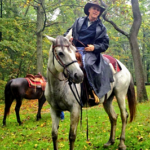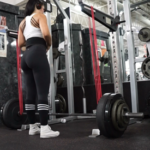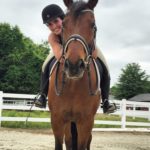
Our friend might kill me when she reads this column, but I can’t help myself. I’m feeling philosophical.
Kimberly and I ran into her at a buddy’s barn where she takes lessons. She rides a beautiful and quiet appendix Quarter Horse, but also owns a few other equines, including a very well-behaved Appaloosa pony. And though he’s much shorter than his fellow farm mates, her Jack Russell terrier is equally charming.
I had never met her “kids” before. I don’t even know if “met” is the right word. It’s certainly the most natural and accurate. Our animals–whether athletes or pets–usually have names and always have personalities. For me it’s a lot like meeting another person. Wait–actually that’s not true. I find being introduced to my fellow humans to be more stressful than meeting other species. I am plagued with insecurities while I’m attempting success with that ever-important, first impression. During the meeting, I know the other person is speaking–at least I can see his or her mouth moving. All I can hear, however, is the voice in my head asking, “Do I smell? Does my hair look funny? Is there spinach in my teeth?” Some days I just can’t take it.
But, I always enjoy meeting new cats, dogs or horses. They don’t care about your hygiene, and I think they actually prefer it if you have spinach in your teeth. Especially the horses, who usually have grass or hay hanging out of their mouths. There–I did it again with that personification thing. I referred to a horse as a “who.” To say “that” or “which” would be like saying “it.” So much for becoming an English teacher, eh? But I digress.
So I met our friend’s kids, and I was really impressed. Our friend is great with them. You can tell when someone finds the right mix of love and firm guidance for their animals. Horses–as well as most other animals–respect that approach. I’m not used to calm Jack Russells or quiet ponies. I’m sure at home they throw the occasional tantrum for mommy, but meeting them was truly a pleasure.
Naturally, it surprised me when she said she was considering giving up the horsey life. She’s spent almost 15 years riding and structuring her life around competing with and owning equines, and she spoke openly of simply walking away from it. I know what you’re thinking, and I agree. Only a horse person would think that giving up horses is a crazy idea and that getting involved with them in the first place is perfectly sane.
What questions, if any, do we ask right before we buy or accept a horse? Granted, I was raised around cats, not horses. But what is the typical internal dialogue right before we add equines to our family? How about, “Hey–here’s an unpredictable, telepathic, 1,200-pound animal, who requires several acres, constant care and could become such a money pit that I might as well just feed hundred-dollar bills instead of hay. Sweet! I’ll take two!” (Now that I think about it, that’s very similar to the dialogue Kimberly and I had before we bought our second horse, Skip.)
My conversation with our friend continued easily–perhaps because I wasn’t sure what to say. I stuck with safe small talk–letting her speak her mind. She’s considering moving closer to town, maybe working more, maybe changing jobs and maybe meeting some more people to spend time with since she would finally have free time. Normally, I might have blurted out, “Give up horses? Are you insane?!” This situation, however, has some added complexity. I held my tongue because our friend only recently finalized her divorce.
Even if she’s not feeling insecure and lonely–which would be natural–she’s certainly upset by part of her life falling short of what she expected and wanted. She admits to being in the throes of a “midlife crisis.” I think the actual crisis may be that she fears her horsey lifestyle not only cost her the marriage, but will also damage her marketability when she returns to the dating scene.
Granted, little about living with horses primes us for functional interaction with other humans. We grow accustomed to spending some or all of our time “on the land,” away from the biggest section of our society. We are not put off by dirt, dust, mud or poop. We think horse sweat and leather are better than your average perfume or cologne. (Kimberly still apologizes for her fragrance when she comes in from riding, but I love the smell. It’s the smell of happiness.) We equine enthusiasts also get excited by the smell of a barn filled with hay. People, in case you’ve forgotten, poop and sweat are unappealing to the majority of our species! No, I don’t care either, I’m just reminding you.
While our friend and I were speaking, she brushed her Quarter Horse. I watched a horse fly roughly the size of a small bird land on his mane. Without missing a brushstroke or beat in our conversation, she killed the fly. Let me tell you that I am very, very manly, and I still resort to the “smack-and-stomp” approach to killing the largest of horse flies. I smack the fly and, stunned, it falls to the ground, then I stomp on it. Or, alternately and more typically, I smack the fly just hard enough to really make it mad and it chases me around the barn until I can find something to hit it with–usually a baseball bat or a chunk of lumber.
Our friend used a different technique. She simply grabbed the fly in her hand, crushed it and tossed it to the ground. It was the coolest thing I’d seen in a long time. I missed some of what she was saying because I was too busy standing in awe. It was then that I realized that there’s no teaching a horse person to be “normal,” whatever that word means. Forget the romance of “My Fair Lady” or “Pretty Woman.” The story of the horse person is more akin to “Tarzan” or “King Kong.” We may never fit in. We can pass ourselves off as normal just long enough to successfully navigate a social situation and return, relatively unscathed, to our equines.
The problem is when we equate society’s confusion with our lifestyle as disapproval. It’s just confusion and nothing more. Some non-horsey people are genuinely interested in learning about this life. I consider myself to be a recovering outsider, and if I can do it, there’s hope for most anyone. I should have said all this to our friend. However, our conversation concluded without my uttering any of this, which is probably why I’m writing this column.
The situation got me thinking about when Kimberly and I met in Denver at a bar where I worked. We were both single and neither of us was looking for someone. We found each other anyway. Kimberly lived in North Carolina, so we settled for the necessary evil of a long-distance relationship. Three months and several visits to North Carolina later, I packed everything I owned and drove cross-country to be with her and her horse, Vander. Ten months later, we were married. (Me and Kimberly, not me and Vander.) Believe me, there were times when I wondered what I had gotten myself into. (With the horses, not the marriage.) The horsey life–and life in general–is an ongoing education. I wanted Kimberly and me to learn about each other, always get along (okay, usually get along), and grow old together. But I never wanted Kimberly to change. I respected the fact that she was a horse person and that’s who she’d remain. I went to the horse shows with her and shared in the responsibilities of ownership.
I wanted to tell our friend that if she still wanted a successful relationship, she shouldn’t give up on it, nor should she give up who she is. I don’t believe anyone spends almost 15 years fully-immersed in the horsey life if they aren’t truly a horse person. It’s too great a commitment to be something accidental or even circumstantial.
Kimberly and I know several single horsewomen. They wear their status like a badge. Ironically, they talk constantly about finding someone. They certainly deserve someone, but horsewomen are just different. Most people can’t keep up with them. Here’s a note to anyone seeking a successful relationship with a horsewoman: let the horse teach you what to do.
If you care for and bond with the horse and then apply the principles to your romantic relationship, you’ll have the essential foundation. How often does a desired mate come with a free relationship counselor? And it works, believe me. Frankly, every relationship would benefit from what horses teach us: be passionate and compassionate, be consistently patient and be attentive and loving. Sometimes you’ll get bucked off, but just get back on. Sometimes they get moody because they just need to be fed. It’s not always easy, but if I leave this world a better person it’s much thanks to the horses I’ve met.
“Okay, Mr. Philosopher” you’re saying, “are you going to talk to your friend? You’ve logged all this time on the soap box–how about some action?” To be honest, I worry that next year she could still be single and angry at me for giving her the “be yourself, girl” pep talk. Then again, I think she’d be miserable without horses.
You’re right. I’ll call her right now.
Jeremy Law and his wife, Kimberly, live on a small farm in North Carolina with their two cats, two dogs and two horses.
Read Jeremy’s other columns in EquiSearch’s Humor section and share your comments in the forum.








